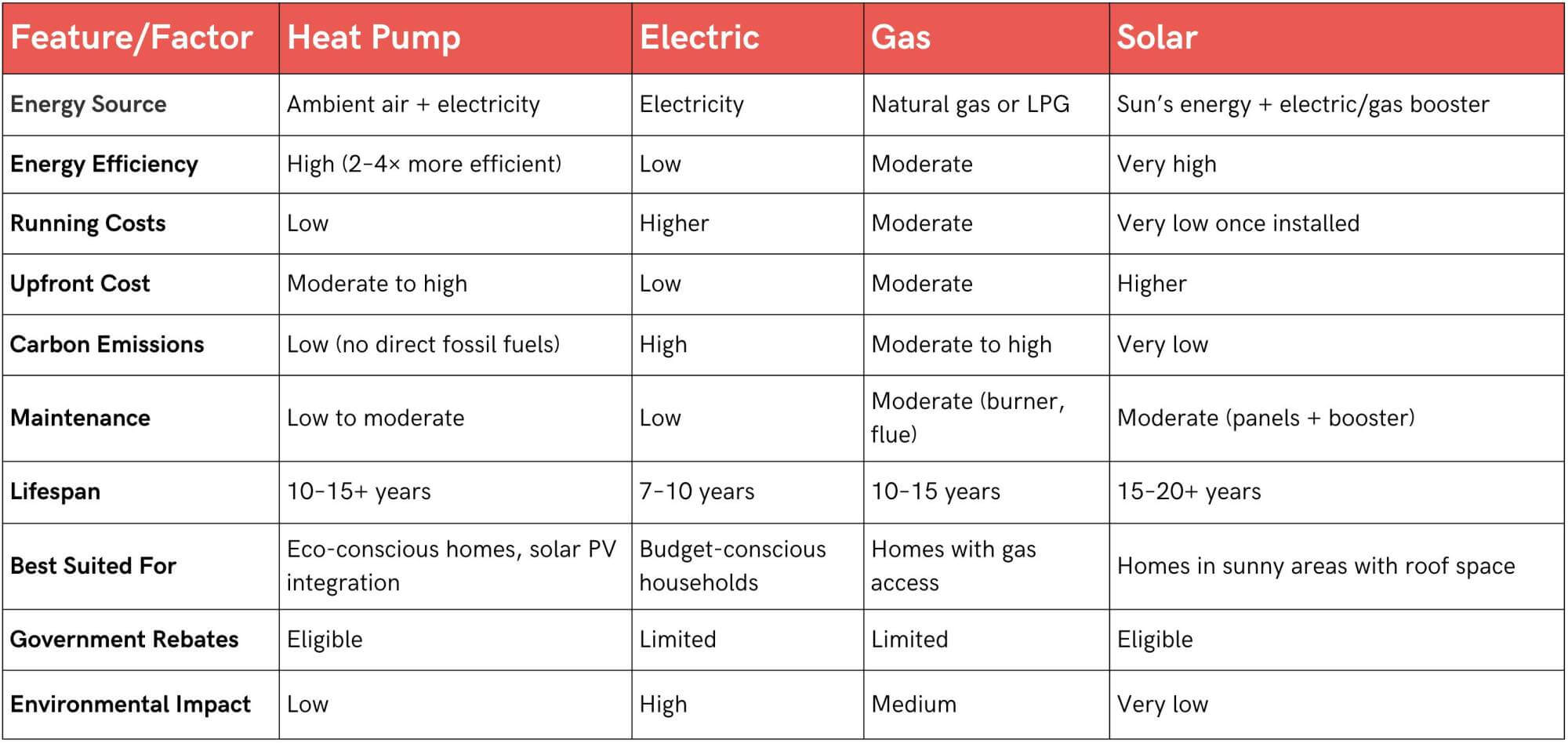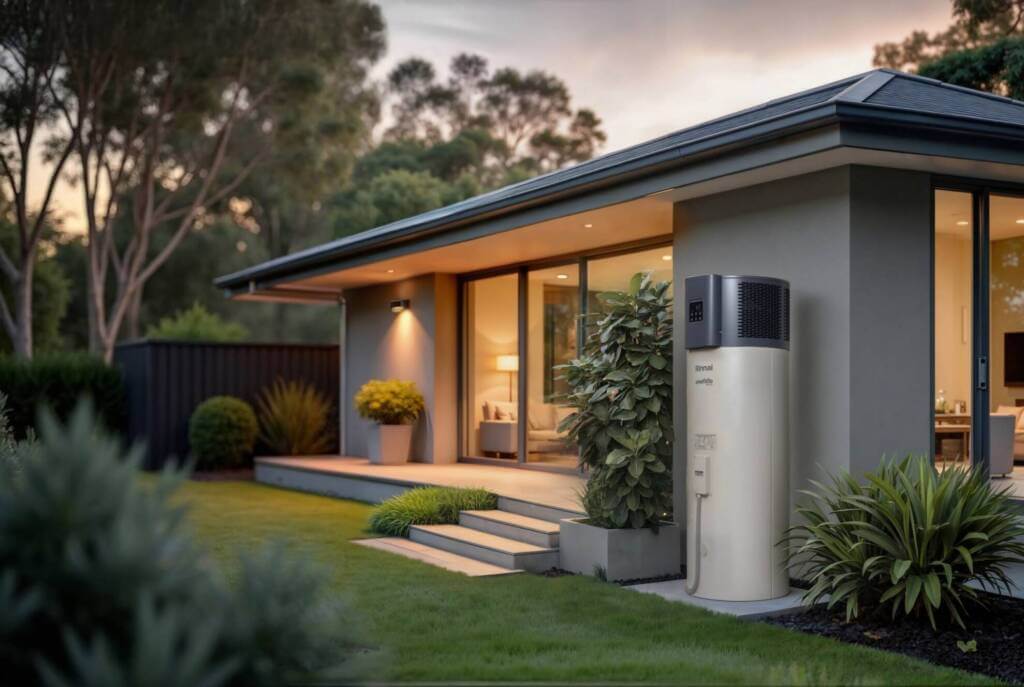Interest in sustainable hot water systems, and in heat pump installations in particular, is growing rapidly across Australia.
It’s true, more households are rethinking how they heat their water. This is the result of a desire to reduce environmental impact, carbon footprint, and save money on energy bills. Among the various options available, heat pump hot water systems are emerging as one of the strongest contenders for the future of hot water, even more so than solar hot water systems.
What Is a Heat Pump Hot Water System?
Before deciding whether heat pump technology is the future of hot water (and the future of your hot water), you need to understand how heat pumps work.
Unlike traditional electric or gas systems that generate heat, a heat pump hot water system extracts heat energy from the surrounding air and transfers it into the water. The easiest way to wrap your head around the tech is to think of it like a reverse fridge. Instead of removing heat from inside, it captures warmth from outside and uses it to heat water stored inside a hot water storage tank.
This process is incredibly efficient because it uses far less electricity than gas and electric water heaters, making it a popular sustainable option, along with solar hot water systems. And unlike gas systems, it doesn’t rely on fossil fuels. And unlike traditional electric systems, heat pumps don’t rely solely on heating elements to warm the water.
Why Heat Pumps Are Gaining Popularity in Australia
Let’s dive further into why heat pumps are rapidly gaining popularity in Australia.
Energy efficiency and cost savings
As mentioned, one of the reasons behind the rise of heat pumps is that they deliver significant energy savings. By transferring existing heat from the air instead of generating it, heat pumps can be up to three times more efficient than conventional electric systems. For many households, this translates to noticeably lower electricity bills over time, and let’s be honest – we all want to save money. What we’re noticing is that many customers are combining heat pumps with solar energy, meaning even more savings.
Environmental benefits and carbon reduction
As more Australians focus on reducing their carbon footprint, especially younger generations coming into home ownership, heat pumps offer a cleaner and greener way to heat water. Because they rely on ambient air, they produce far fewer greenhouse gas emissions than gas systems, making them an attractive option for the environmentally conscious.
Noise, maintenance, and lifespan considerations
The other great thing about modern heat pumps is that they run quietly, with most units producing minimal background noise. Furthermore, they require less maintenance than gas systems and typically have a longer lifespan, often 10 to 15 years or more with proper care. While the upfront investment can be higher, these factors alone make heat pumps worth the investment.
Comparing Heat Pumps with Other Hot Water Systems
Here’s a clean, easy-to-scan comparison chart that lays out the key differences between heat pump, electric, gas, and solar hot water systems:

Government Incentives and Rebates
If you’re still not convinced about heat pumps, did you know there could be government incentives waiting to help you make the switch? Australia offers several rebate programs designed to encourage more energy-efficient systems in households.
Many heat pump systems are eligible for federal and state-based rebates, including programs like Small-scale Technology Certificates (STCs) across Australia, with rebates ranging from $504 to $684, depending on the system’s size and the location.
Let’s take a look at the additional schemes by states.
New South Wales
Along with the federal STC scheme, the NSW ESS provides additional rebates, offering an estimated $240 for replacing an electric hot water system with a 200L heat pump and $110 for replacing a gas system with a high-efficiency heat pump, based on the energy savings achieved.
Victorian governments
The Solar Victoria Hot Water Rebate offers up to $1,000 for eligible systems, increasing to $1,400 if the product is locally made and selected from approved models. Additionally, if you currently have a gas system, the Victorian Energy Upgrades (VEU) program provides Victorian Energy Efficiency Certificates (VEECs), offering rebates of approximately $630–$750 when replacing an inefficient electric system and $560–$675 when replacing a gas system.
As of late 2025, Queensland, Western Australia, Northern Territory, and Tasmania do not offer state-level rebates for heat pump hot water systems. However, residents in these states and territories can still access the aforementioned federal Small-scale Technology Certificate (STC) scheme.
Common Concerns About Heat Pumps
Now, like anything in life, heat pumps are not perfect. There are some things you should be aware of before making the switch. But most of these concerns are manageable when you understand how the systems actually work.
Performance in colder climates
One of the most common myths is that heat pumps don’t work in cooler regions. This stems from the fact that they extract heat from the air, so it’s easy to see why. But the truth is, modern models are designed to operate efficiently in temperatures as low as –10 °C. Given Australia’s overall climate, this makes them suitable for most parts of the country, bar maybe the NSW Snowy Mountains or the Victorian Alps in winter.
Installation costs
While the upfront investment can be higher than traditional systems, you need to factor in the long-term energy savings. Any rebates will also help offset these costs.
Noise levels
We mentioned that one benefit is how quiet they are; however, earlier heat pump models were noisier. But the tech has since improved, with most modern units operating at low decibel levels, comparable to a quiet refrigerator.
The Future of Hot Water in Australia
So, the question remains: are heat pumps really the future of hot water in Australia? In our opinion, all signs point toward yes.
With the federal and state governments increasingly incentivising Aussies towards renewable hot water technologies through rebates, efficiency standards, and decarbonisation targets, we expect the switch to heat pumps to continue. The push aligns perfectly with the low-emission profile of heat pump systems.
Moreover, more manufacturers are investing in advanced heat pump technology. And this creates a roll-on effect where plumbers across the country are expanding their installation expertise to meet the growing demand. Sales of heat pump units have steadily increased year-on-year, even outpacing traditional electric systems in some regions.
While solar has also seen strong uptake and will remain a strong player, heat pumps are likely to become the default hot water solution for many Australian homes. Again, this is thanks to their year-round efficiency, flexibility, and strong government support.
Is a Heat Pump Right for You?
Now you might be wondering if a heat pump is right for you. The good news is, for many Aussie homeowners, it’s one of the smartest long-term investments you can make in your home’s energy efficiency and comfort.
Ask yourself:
- Are you looking to reduce electricity bills and reliance on fossil fuels?
- Are you a larger household/family with consistent hot water demand?
- Are you environmentally conscious, wanting a more sustainable solution?
If you answer to at least two of the above, then take the plunge. But first, here are some key factors to consider:
- Climate: While heat pumps work well across most of Australia, they perform best in mild to warm conditions.
- Household size: A properly sized system ensures reliable hot water without energy waste.
- Budget: Rebates can significantly lower upfront costs, making premium systems more accessible.
When you weigh up the energy savings, lower environmental impact, and future-proof technology, it’s easy to see why heat pumps are shaping the future of hot water in Australia.
Shop heat pumps today at Same Day Hot Water Service or speak to one of our friendly, licensed installers to find the right system for your home.
FAQs
What are the negatives about a heat pump hot water system?
While they offer hot water system improvements and energy efficiency, heat pumps can have higher upfront costs and reduced performance in very cold climates.
Why may heat pumps not be the future?
Some homeowners worry about installation costs and performance limitations, but renewable energy incentives are helping address these concerns.
What are the changes for heat pumps in 2025?
In 2025, increased government support and efficiency standards are expected to make heat pumps more accessible and deliver significant cost savings.
Why are heat pumps not replacing traditional heating?
They’re growing fast, but factors like upfront costs and infrastructure needs mean gas and electric systems still dominate despite rising energy costs.
Are gas hot water systems being phased out?
Yes, there’s a gradual shift away from gas as renewable energy solutions like heat pumps and solar become more affordable and widespread.

